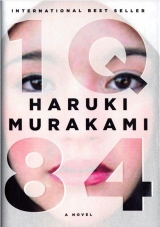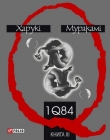
Текст книги "1q84"
Автор книги: Haruki Murakami
Жанр:
Современная проза
сообщить о нарушении
Текущая страница: 4 (всего у книги 81 страниц)
“Ah, what the hell,” the man said, with a click of his tongue. “I made a point of taking a room so I could work undisturbed.”
He pointed to the papers on the desk—a pile of detailed charts and graphs he had printed out, probably materials he was preparing for a late meeting. He had a computer and a calculator, and scratch paper with long lines of figures.
Aomame knew that he worked for a corporation connected with oil. He was a specialist on capital investment in a number of Middle Eastern countries. According to the information she had been given, he was one of the more capable men in the field. She could see it in the way he carried himself. He came from a good family, earned a sizable income, and drove a new Jaguar. After a pampered childhood, he had gone to study abroad, spoke good English and French, and exuded self-confidence. He was the type who could not bear to be told what to do, or to be criticized, especially if the criticism came from a woman. He had no difficulty bossing others around, though, and cracking a few of his wife’s ribs with a golf club was no problem at all. As far as he was concerned, the world revolved around him, and without him the earth didn’t move at all. He could become furious—violently angry—if anyone interfered with what he was doing or contradicted him in any way.
“Sorry to trouble you, sir,” Aomame said, flashing him her best business smile. As if it were a fait accompli, she squeezed halfway into the room, pressing her back against the door, readied her clipboard, and started writing something on it with a ballpoint pen. “That was, uh, Mr. Miyama, I believe …?” she asked. Having seen his photo any number of times, she knew his face well, but it wouldn’t hurt to make sure she had the right person. There was no way to correct a mistake.
“Yes, of course. Miyama,” he said curtly. He followed this with a resigned sigh that seemed to say, “All right. Do as you damn please.” He took his seat at the desk and, with a ballpoint pen in one hand, picked up whatever document he had been reading. His suit coat and a striped tie lay on the fully made double bed where he had thrown them. They were both obviously very expensive. Aomame walked straight for the closet, her bag hanging from her shoulder. She had been told that the air conditioner switch panel was in there. Inside she found a trench coat of soft material and a dark gray cashmere scarf. The only luggage was a leather briefcase. No change of clothes, no bag for toiletries. He was probably not planning to stay the night. On the desk stood a coffeepot that had obviously been delivered by room service. She pretended to inspect the switch panel for thirty seconds and then called out to Miyama.
“Thank you, Mr. Miyama, for your cooperation. I can’t find any problem with the equipment in this room.”
“Which is what I was trying to tell you from the start,” he grumbled.
“Uh … Mr. Miyama …?” she ventured. “Excuse me, but I think you have something stuck to the back of your neck.”
“The back of my neck?” he said. He rubbed the area and then stared at the palm of his hand. “I don’t think so.”
“Please just let me have a look,” she said, drawing closer. “Do you mind?”
“Sure, go ahead,” he said, looking puzzled. “What is it?”
“A spot of paint, I think. Bright green.”
“Paint?”
“I’m not really sure. Judging from the color, it has to be paint. Is it all right if I touch you back there? It may come right off.”
“Well, okay,” Miyama said, ducking his head forward, exposing the back of his neck to Aomame. It was bare, thanks to what looked like a recent haircut. Aomame took a deep breath and held it, concentrating her attention on her fingers’ nimble search for the right spot. She pressed a fingertip there as if to mark the place, then closed her eyes, confirming that her touch was not mistaken. Yes, this is it. I’d like to take more time if possible to make doubly certain, but it’s too late for that now. I’ll just have to do my best with the situation I’ve been given.
“Sorry, sir, but do you mind holding that position a bit longer? I’ll take a penlight from my bag. The lighting in here is not very good.”
“Why would I have paint back there, of all things?”
“I have no idea, sir. I’ll check it right away.”
Keeping her finger pressed against the spot on the man’s neck, Aomame drew a hard plastic case from her bag, opened it, and took out an object wrapped in thin cloth. With a few deft moves she unfolded the cloth, revealing something like a small ice pick about four inches in length with a compact wooden handle. It looked like an ice pick, but it was not meant for cracking ice. Aomame had designed and made it herself. The tip was as sharp and pointed as a needle, and it was protected from breakage by a small piece of cork—cork that had been specially processed to make it as soft as cotton. She carefully plucked the cork from the point and slipped it into her pocket. She then held the exposed point against that special spot on Miyama’s neck. Calm down now, this is it, Aomame told herself. I can’t be off by even one-hundredth of an inch. One slip and all my efforts will be wasted. Concentration is the key.
“How much longer is this going to take?” Miyama protested.
“I’m sorry, sir, I’ll be through in a moment.”
Don’t worry, she said to him silently, it’ll all be over before you know it. Wait just a second or two. Then you won’t have to think about a thing. You won’t have to think about the oil refining system or crude oil market trends or quarterly reports to the investors or Bahrain flight reservations or bribes for officials or presents for your mistress. What a strain it must have been for you to keep these things straight in your head all this time! So please, just wait a minute. I’m hard at work here, giving it all the concentration I can muster. Don’t distract me. That’s all I ask.
Once she had settled on the location and set her mind to the task, Aomame raised her right palm in the air, held her breath, and, after a brief pause, brought it straight down—not too forcefully—against the wooden handle. If she applied too much force, the needle might break under the skin, and leaving the needle tip behind was out of the question. The important thing was to bring the palm down lightly, almost tenderly, at exactly the right angle with exactly the right amount of force, without resisting gravity, straight down, as if the fine point of the needle were being sucked into the spot with the utmost naturalness—deeply, smoothly, and with fatal results. The angle and force—or, rather, the restraint of force—were crucial. As long as she was careful about those details, it was as simple as driving a needle into a block of tofu. The needle pierced the skin, thrust into the special spot at the base of the brain, and stopped the heart as naturally as blowing out a candle. Everything ended in a split second, almost too easily. Only Aomame could do this. No one else could find that subtle point by touch. Her fingertips possessed the special intuition that made it possible.
She heard him draw a sharp breath, and then every muscle in his body went stiff. Instantly, she withdrew the needle and just as quickly took out the small gauze pad she had ready in her pocket, pressing it against the wound to prevent the flow of blood. Because the needle was so fine and had remained in his skin for no more than a few seconds, only a minuscule amount of blood could possibly escape through the opening, but she had to take every precaution. She must not leave even the slightest trace of blood. One drop could ruin everything. Caution was Aomame’s specialty.
The strength began to drain from Miyama’s body, which had momentarily stiffened, like air going out of a basketball. Keeping her finger on the spot on his neck, Aomame let him slump forward onto the desk. His face lay sideways, pillowed on his documents. His eyes were wide open in apparent surprise, as if his last act had been to witness something utterly amazing. They showed neither fear nor pain, only pure surprise. Something out of the ordinary was happening to him, but he could not comprehend what it was—a pain, an itch, a pleasure, or a divine revelation? There were many different ways of dying in the world, perhaps none of them as easy as this.
This was an easier death than you deserved, Aomame thought with a scowl. It was just too simple. I probably should have broken a few ribs for you with a five iron and given you plenty of pain before putting you out of your misery. That would have been the right kind of death for a rat like you. It’s what you did to your wife. Unfortunately, however, the choice was not mine. My mission was to send this man to the other world as swiftly and surely—and discreetly—as possible. Now, I have accomplished that mission. He was alive until a moment ago, and now he’s dead. He crossed the threshold separating life from death without being aware of it himself.
Aomame held the gauze in place for a full five minutes, patiently, but without pressing hard enough for her finger to leave an indentation. She kept her eyes glued on the second hand of her watch. It was a very long five minutes. If someone had walked in then and seen her pressing her finger against the man’s neck while holding the slender murder weapon in the other hand, it would have been all over. She could never have talked her way out of it. A bellhop could bring a pot of coffee. There could be a knock on the door at any moment. But this was an indispensable five minutes. To calm herself, Aomame took several slow deep breaths. I can’t get flustered now. I can’t lose my composure. I have to stay the same calm, cool Aomame as always.
She could hear her heart beating. And in her head, in time with the beat, resounded the opening fanfare of Janáček’s Sinfonietta. Soft, silent breezes played across the green meadows of Bohemia. She was aware that she had become split in two. Half of her continued to press the dead man’s neck with utter coolness. The other half was filled with fear. She wanted to drop everything and get out of this room now. I’m here, but I’m not here. I’m in two places at once. It goes against Einstein’s theorem, but what the hell. Call it the Zen of the killer.
The five minutes were finally up. But just to make sure, Aomame gave it one more minute. I can wait another minute. The greater the rush, the more care one should take with the job. She endured the extra minute, which seemed as if it would never end. Then she slowly pulled her finger away and examined the wound with her penlight. A mosquito’s stinger left a larger hole than this.
Stabbing the special point at the base of the brain with an exceptionally fine needle causes a death that is almost indistinguishable from a natural sudden death. It would look like a heart attack to most ordinary doctors. It hit him without warning while he was working at his desk, and he breathed his last. Overwork and stress. No sign of unnatural causes. No need for an autopsy.
This man was a high-powered operator, but also prone to overwork. He earned a high salary, but he couldn’t use it now that he was dead. He wore Armani suits and drove a Jaguar, but finally he was just another ant, working and working until he died without meaning. The very fact that he existed in this world would eventually be forgotten. “Such a shame, he was so young,” people might say. Or they might not.
Aomame took the cork from her pocket and placed it on the needle. Wrapping the delicate instrument in the thin cloth again, she returned it to the hard case, which she placed in the bottom of the shoulder bag. She then took a hand towel from the bathroom and wiped any fingerprints she might have left in the room. These would all be on the air conditioner panel and the doorknob. She had been careful not to touch anything else. She returned the towel to the bathroom. Placing the man’s cup and coffeepot on the room service tray, she set them in the corridor. This way the bellhop would not have to knock when he came to retrieve them, and the discovery of the body would be delayed that much more. If all went well, the maid would find the body after checkout time tomorrow.
When he failed to show up at tonight’s meeting, people might ring the room, but there would be no answer. They might think it odd enough to have the manager open the room, but then again they might not. Things would simply take their course.
Aomame stood before the bathroom mirror to make sure nothing about her clothing was in disarray. She closed the top button of her blouse. She had not had to flash cleavage. The bastard had hardly looked at her. What the hell did other people mean to him? She tried out a medium frown. Then she straightened her hair, massaged her facial muscles with her fingertips to soften them, and flashed the mirror a sweet smile, revealing her recently cleaned white teeth. All right, then, here I go, out of the dead man’s room and back to the real world. Time to adjust the atmospheric pressure. I’m not a cool killer anymore, just a smiling, capable businesswoman in a sharp suit.
She opened the door a crack, checked to see that there was no one in the corridor, and slipped out. She took the stairs rather than the elevator. No one paid her any mind as she passed through the lobby. Posture erect, she stared straight ahead and walked quickly—though not quickly enough to attract attention. She was a pro, virtually perfect. If only her breasts were a little bigger, she thought with a twinge, she might have been truly perfect. A partial frown. But hell, you’ve gotta work with what you’ve got.
CHAPTER 4
Tengo
IF THAT IS WHAT YOU WANT TO DO
The phone woke Tengo. The luminous hands of his clock pointed to a little after one a.m. The room was dark, of course. Tengo knew the call was from Komatsu. No one but Komatsu would call him at one in the morning—and keep the phone ringing until he picked it up, however long it took. Komatsu had no sense of time. He would place a call the moment a thought struck him, never considering the hour. It could be the middle of the night or the crack of dawn. The other person could be enjoying his wedding night or lying on his deathbed. The prosaic thought never seemed to enter Komatsu’s egg-shaped head that a call from him might be disturbing.
Which is not to say that he did this with everyone. Even Komatsu worked for an organization and collected a salary. He couldn’t possibly go around behaving toward everyone with a total disregard for common sense. Only with Tengo could he get away with it. Tengo was, for Komatsu, little more than an extension of Komatsu himself, another arm or leg. If Komatsu was up, Tengo must be up. Tengo normally went to bed at ten o’clock and woke at six, maintaining a generally regular lifestyle. He was a deep sleeper. Once something woke him, though, it was hard for him to get to sleep again. He was high-strung to that extent. He had tried to explain this to Komatsu any number of times, and pleaded with him not to call in the middle of the night, like a farmer begging God not to send swarms of locusts into his fields before harvest time.
“Got it,” Komatsu declared. “No more nighttime calls.” But his promise had not sunk deep roots in his brain. One rainfall was all it took to wash them out.
Tengo crawled out of bed and, bumping into things, managed to find his way to the phone in the kitchen. All the while, the phone kept up its merciless ringing.
“I talked to Fuka-Eri,” Komatsu said. He never bothered with the standard greetings, no “Were you sleeping?” or “Sorry to call so late.” Pretty impressive. Tengo couldn’t help admiring him.
Tengo frowned in the dark, saying nothing. When roused at night, it took his brain a while to start working.
“Did you hear what I said?”
“Yes, I did.”
“It was just a phone call. But I did talk to her. Or at her. She just listened. You couldn’t exactly call it a conversation. She hardly talks. And she’s got an odd way of speaking. You’ll see what I mean. Anyhow, I gave her a general outline of my plan, like, what did she think of the idea of going after the new writers’ prize by having somebody rewrite Air Chrysalis to get it into better shape? I couldn’t give her much more than a rough idea on the phone and ask her if she had any interest, assuming we’d meet and talk over the details. I kept it sort of vague. If I got too direct about stuff like this, I could put myself in an awkward position.”
“And so?”
“No answer.”
“No answer?”
Komatsu paused for effect. He put a cigarette between his lips and lit it with a match. Hearing the sounds over the phone, Tengo could imagine the scene vividly. Komatsu never used a lighter.
“Fuka-Eri says she wants to meet you first,” Komatsu said, exhaling. “She didn’t say whether or not she was interested in the plan, or whether or not she liked the idea. I guess the main thing is to start by meeting you and talking about it face-to-face. She’ll give me her answer after that, she says. The responsibility is all yours, don’t you think?”
“And so?”
“Are you free tomorrow evening?”
His classes started in the morning and ended at four. Fortunately (or unfortunately) he had nothing after that. “I’m free,” he said.
“Good. I want you to go to the Nakamuraya Café in Shinjuku at six o’clock. I’ll reserve a table for you in the back where it’s quiet. It’ll be in my name and on the company’s tab, so eat and drink as much as you like. The two of you can have a nice, long talk.”
“Without you?”
“That’s the way Fuka-Eri wants it. She says there’s no point in meeting me yet.”
Tengo kept silent.
“So that’s how it is,” Komatsu said cheerily. “Give it your best shot, Tengo. You’re a big lug, but you make a good impression on people. And besides, you teach at a cram school. You’re used to talking to these precocious high school girls. You’re the right guy for the job, not me. Flash her a smile, win her over, get her to trust you. I’ll be looking forward to the good news.”
“Now, wait just a minute. This was all your idea. I still haven’t even told you if I’ll do it. Like I said the other day, this is a tremendously risky plan, and I don’t see it working all that well. It could turn into a real scandal. How am I supposed to convince this girl I’ve never met to go along with it when I myself haven’t decided to take it on?”
Komatsu remained silent at his end. Then, after a moment’s pause, he said, “Now listen, Tengo. We’ve already pulled out of the station. You can’t stop the train and get off now. I’m totally committed. And you’re more than half committed, I’m sure. We share the same fate.”
Tengo shook his head. Share the same fate? When did this melodrama get started? “Just the other day you told me to take my time and think it over, didn’t you?”
“It’s been five days since then. You’ve had plenty of time to think it over. What’s your decision?” Komatsu demanded.
Tengo was at a loss for words. “I don’t have a decision,” he said honestly.
“So then, why don’t you try meeting this Fuka-Eri girl and talking it over? You can make up your mind after that.”
Tengo pressed his fingertips hard against his temples. His brain was still not working properly. “All right. I’ll talk to her. Six o’clock tomorrow at the Shinjuku Nakamuraya. I’ll give her my explanation of the situation. But I’m not promising any more than that. I can explain the plan, but I can’t convince her of anything.”
“That’s all I ask, of course.”
“So anyway, how much does Fuka-Eri know about me?”
“I filled her in on the general stuff. You’re twenty-nine or thirty, a bachelor, you teach math at a Yoyogi cram school. You’re a big guy, but not a bad guy. You don’t eat young girls. You live a simple lifestyle, you’ve got gentle eyes. And I like your writing a lot. That’s about it.”
Tengo sighed. When he tried to think, reality hovered nearby, then retreated into the distance.
“Do you mind if I go back to bed? It’s almost one thirty, and I want at least a little sleep before the sun comes up. I’ve got three classes tomorrow starting in the morning.”
“Fine. Good night,” Komatsu said. “Sweet dreams.” And he hung up.
Tengo stared at the receiver in his hand for a while, then set it down. He wanted to get to sleep right away if possible, and to have good dreams if possible, but he knew it wouldn’t be easy after having been dragged out of bed and forced to participate in an unpleasant conversation. He could try drinking himself to sleep, but he wasn’t in the mood for alcohol. He ended up drinking a glass of water, getting back in bed, turning on the light, and beginning to read a book. He hoped it would make him sleepy, but he didn’t actually fall asleep until almost dawn. Tengo took the elevated train to Shinjuku after his third class ended. He bought a few books at the Kinokuniya bookstore, and then headed for the Nakamuraya Café. He gave Komatsu’s name at the door and was shown to a quiet table in the back. Fuka-Eri was not there yet. Tengo told the waiter he would wait for the other person to come. Would he want something to drink while he waited? He said that he would not. The waiter left a menu and a glass of water on the table. Tengo opened one of his new books and started reading. It was a book on occultism and it detailed the function of curses in Japanese society over the centuries. Curses played a major role in ancient communities. They had made up for the gaps and inconsistencies in the social system. It seemed like an enjoyable time to be alive.
Fuka-Eri had still not come at six fifteen. Unconcerned, Tengo went on reading. It didn’t surprise him that she was late. This whole business was so crazy, he couldn’t complain to anybody if it took another crazy turn. It would not be strange if she changed her mind and decided not to show up at all. In fact, he would prefer it that way—it would be simpler. He could just report to Komatsu that he waited an hour and she never showed. What would happen after that was no concern of his. He would just eat dinner by himself and go home, and that would satisfy his obligation to Komatsu.
Fuka-Eri arrived at 6:22. The waiter showed her to the table and she sat down across from Tengo. Resting her small hands on the table, not even removing her coat, she stared straight at him. No “Sorry I’m late,” or “I hope I didn’t keep you waiting too long.” Not even a “Hi” or a “Nice to meet you.” All she did was look directly at Tengo, her lips forming a tight, straight line. She could have been observing a new landscape from afar. Tengo was impressed.
Fuka-Eri was a small girl, small all over, and her face was more beautiful than in the pictures. Her most attractive facial feature was her deep, striking eyes. Under the gaze of two glistening, pitch-black pupils, Tengo felt uncomfortable. She hardly blinked and seemed almost not to be breathing. Her hair was absolutely straight, as if someone had drawn each individual strand with a ruler, and the shape of her eyebrows matched the hair perfectly. As with many beautiful teenage girls, her expression lacked any trace of everyday life. It also was strangely unbalanced—perhaps because there was a slight difference in the depth of the left and right eyes—causing discomfort in the recipient of her gaze. You couldn’t tell what she was thinking. In that sense, she was not the kind of beautiful girl who becomes a model or a pop star. Rather, she had something about her that aroused people and drew them toward her.
Tengo closed his book and laid it to one side. He sat up straight and took a drink of water. Komatsu had been right. If a girl like this took a literary prize, the media would be all over her. It would be a sensation. And then what?
The waiter came and placed a menu and a glass of water in front of her. Still she did not move. Instead of picking up the menu, she went on staring at Tengo. He felt he had no choice but to say something. “Hello.” In her presence, he felt bigger than ever.
Fuka-Eri did not return his greeting but continued to stare at him. “I know you,” she murmured at last.
“You know me?” Tengo said.
“You teach math.”
He nodded. “I do.”
“I heard you twice.”
“My lectures?”
“Yes.”
Her style of speaking had some distinguishing characteristics: sentences shorn of embellishment, a chronic shortage of inflection, a limited vocabulary (or at least what seemed like a limited vocabulary). Komatsu was right: it was odd.
“You mean you’re a student at my school?” Tengo asked.
Fuka-Eri shook her head. “Just went for lectures.”
“You’re not supposed to be able to get in without a student ID.”
Fuka-Eri gave a little shrug, as if to say, “Grown-ups shouldn’t say such dumb things.”
“How were the lectures?” Tengo asked, his second meaningless question.
Fuka-Eri took a drink of water without averting her gaze. She did not answer the question. Tengo guessed he couldn’t have made too bad an impression if she came twice. She would have quit after the first one if it hadn’t aroused her interest.
“You’re in your third year of high school, aren’t you?” Tengo asked.
“More or less.”
“Studying for college entrance exams?”
She shook her head.
Tengo could not decide whether this meant “I don’t want to talk about my college entrance exams” or “I wouldn’t be caught dead taking college entrance exams.” He recalled Komatsu’s remark on how little Fuka-Eri had to say.
The waiter came for their orders. Fuka-Eri still had her coat on. She ordered a salad and bread. “That’s all,” she said, returning the menu to the waiter. Then, as if it suddenly occurred to her, she added, “And a glass of white wine.”
The young waiter seemed about to ask her age, but she gave him a stare that made him turn red, and he swallowed his words. Impressive, Tengo thought again. He ordered seafood linguine and decided to join Fuka-Eri in a glass of white wine.
“You’re a teacher and a writer,” Fuka-Eri said. She seemed to be asking Tengo a question. Apparently, asking questions without question marks was another characteristic of her speech.
“For now,” Tengo said.
“You don’t look like either.”
“Maybe not,” he said. He thought of smiling but couldn’t quite manage it. “I’m certified as an instructor and I do teach courses at a cram school, but I’m not exactly a teacher. I write fiction, but I’ve never been published, so I’m not a writer yet, either.”
“You’re nothing.”
Tengo nodded. “Exactly. For the moment, I’m nothing.”
“You like math.”
Tengo mentally added a question mark to her comment and answered this new question: “I do like math. I’ve always liked it, and I still like it.”
“What about it.”
“What do I like about math? Hmm. When I’ve got figures in front of me, it relaxes me. Kind of like, everything fits where it belongs.”
“The calculus part was good.”
“You mean in my lecture?”
Fuka-Eri nodded.
“Do you like math?”
She gave her head a quick shake. She did not like math.
“But the part about calculus was good?” he asked.
Fuka-Eri gave another little shrug. “You talked about it like you cared.”
“Oh, really?” Tengo said. No one had ever told him this before.
“Like you were talking about somebody important to you,” she said.
“I can maybe get even more passionate when I lecture on sequences,” Tengo said. “Sequences were a personal favorite of mine in high school math.”
“You like sequences,” Fuka-Eri asked, without a question mark.
“To me, they’re like Bach’s Well-Tempered Clavier. I never get tired of them. There’s always something new to discover.”
“I know the Well-Tempered Clavier.”
“You like Bach?”
Fuka-Eri nodded. “The Professor is always listening to it.”
“The Professor? One of your teachers?”
Fuka-Eri did not answer. She looked at Tengo with an expression that seemed to say, “It’s too soon to talk about that.”
She took her coat off as if it had only now occurred to her to do so. She emerged from it like an insect sloughing off its skin. Without bothering to fold it, she set it on the chair next to hers. She wore a thin crew-neck sweater of pale green and white jeans, with no jewelry or makeup, but still she stood out. She had a slender build, in proportion to which her full breasts could not help but attract attention. They were beautifully shaped as well. Tengo had to caution himself not to look down there, but he couldn’t help it. His eyes moved to her chest as if toward the center of a great whirlpool.
The two glasses of white wine arrived. Fuka-Eri took a sip of hers, and then, after thoughtfully studying the glass, she set it on the table. Tengo took a perfunctory sip. Now it was time to talk about important matters.
Fuka-Eri brought her hand to her straight black hair and combed her fingers through it for a while. It was a lovely gesture, and her fingers were lovely, each seemingly moving according to its own will and purpose as if in tune with something occult.
“What do I like about math?” Tengo asked himself aloud again in order to divert his attention from her fingers and her chest. “Math is like water. It has a lot of difficult theories, of course, but its basic logic is very simple. Just as water flows from high to low over the shortest possible distance, figures can only flow in one direction. You just have to keep your eye on them for the route to reveal itself. That’s all it takes. You don’t have to do a thing. Just concentrate your attention and keep your eyes open, and the figures make everything clear to you. In this whole, wide world, the only thing that treats me so kindly is math.”
Fuka-Eri thought about this for a while. “Why do you write fiction,” she asked in her expressionless way.
Tengo converted her question into longer sentences: “In other words, if I like math so much, why do I go to all the trouble of writing fiction? Why not just keep doing math? Is that it?”
She nodded.
“Hmm. Real life is different from math. Things in life don’t necessarily flow over the shortest possible route. For me, math is—how should I put it?—math is all too natural. It’s like beautiful scenery. It’s just there. There’s no need to exchange it with anything else. That’s why, when I’m doing math, I sometimes feel I’m turning transparent. And that can be scary.”





